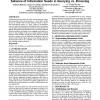Free Online Productivity Tools
i2Speak
i2Symbol
i2OCR
iTex2Img
iWeb2Print
iWeb2Shot
i2Type
iPdf2Split
iPdf2Merge
i2Bopomofo
i2Arabic
i2Style
i2Image
i2PDF
iLatex2Rtf
Sci2ools
SIGIR
2008
ACM
2008
ACM
Talking the talk vs. walking the walk: salience of information needs in querying vs. browsing
Traditional information retrieval models assume that users express their information needs via text queries (i.e., their "talk"). In this poster, we consider Web browsing behavior outside of interactions with retrieval systems (i.e., users' "walk") as an alternative source of signal describing users' information needs, and compare it to the query-expressed information needs on a large dataset. Our findings demonstrate that information needs expressed in different behavior modalities are largely non-overlapping, and that past behavior in each modality is the most accurate predictor of future behavior in that modality. Results also show that browsing data provides a stronger source of signal than search queries due to its greater volume, which explains previous work that has found implicit behavioral data to be a valuable source of information for user modeling and personalization. Keywords Predictive user modeling, user profiles, personalization.
| Added | 15 Dec 2010 |
| Updated | 15 Dec 2010 |
| Type | Journal |
| Year | 2008 |
| Where | SIGIR |
| Authors | Mikhail Bilenko, Ryen W. White, Matthew Richardson, G. Craig Murray |
Comments (0)

